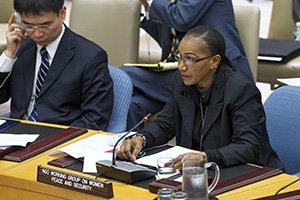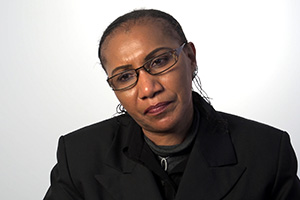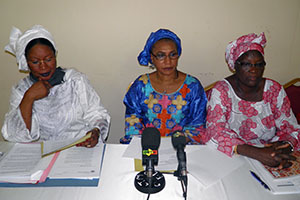Girls receive a visit from a different man every night, a ‘new husband’: In the words of Saran Keïta Diakité
Date:
Saran Keïta Diakité is a lawyer in Mali and President of the Malian branch of the NGO Working Group on Women Peace and Security (Réseau Paix et Sécurité des Femmes de l’Espace CEDEAO). As the Donor Conference on Mali starts in Brussels, in her own words she speaks about the atrocities occurring in her country, which has been plagued by political instability and the proliferation of armed groups that have uprooted more than 415,000 people since a military coup d’état in March 2012. She also talks about the work of her NGO, supported by UN Women, to assist survivors of violence, provide access to justice, and to ensure women have a say in peace negotiations. She was one of four female mediators who took part in peace negotiations from 15-17 April 2012 in Ouagadougou, Burkina Faso. Saran also recently spoke in April 2013 at the UN Security Council’s Open Debate on conflict-related sexual violence in New York.

At the outbreak of the crisis, UN Women commissioned a study in the regions of Gao, Menaka and Ansongo, in April and May 2012 and in September 2012. The outcomes of that study revealed over 100 cases of rape, both individual and gang rape. When these women talk about what happened, it’s appalling. The victims’ ages range from 9 to 70. Imagine the horrors that these survivors have endured.
Throughout the occupied regions, girls are forced into marriage. When an Islamist marries you, you can be sure that, at night, you will be visited by at least four or five people, and that every night, you’ll receive a visit from a different man, a “new husband”. One girl told me: “it was by the smell that I knew that it was a different man coming to me every time. Every time, I was aware of a different smell than the last time.”
The Islamists perform religious marriages in order to escape the clutches of international criminal justice. They carry out a form of “marriage” so that, at night, you can be treated as a sexual slave. During the day, you are there to serve tea to the men and attend to their every need. This is why I always say that what’s happened in Mali is unprecedented.
It’s true to say that rape is being used as a weapon of war.
Imagine, in Gao, armed men bursting in on a family. The husband is there. They seize his wife, rape his wife and his daughter. I warn you, what I’m going to say is hard but they force him to rape his daughter. It’s dreadful. When you do that to a man, it takes away his humanity. Even if he wants to resist, he can’t. It’s to be expected, it’s human.
Anyone who turns a woman’s body into a trophy of war, he’s already won the battle. He doesn’t need any other weapons. He’s already won.
UN Women

UN Women has supported the Association of Malian Women Lawyers (AJM) in implementing a prevention project and care services for women and girls who are victims of the conflict in Mali. Units providing integrated care services have been established in Bamako, Mopti and Kati for communities that have been affected psychologically. The purpose is for women and girls in particular, who are the victims of these atrocities, to be able to go to these care units. Psychologists, lawyers and doctors are also there, available for consultation.
UN Women has helped women to obtain prescriptions, and has guided them towards health centres where they will benefit from the services of the Association of Malian Lawyers, funded by UN Women. This project has made it possible to identify numerous cases of rape, individual and gang rape. A special fund has been established to provide legal services to the victims on a voluntary basis.
Getting compensation for injury suffered is extremely difficult when it is necessary to operate on a case-by-case basis. Dealing with lawyers who are unsympathetic can mean that claiming damages gets compared to a form of prostitution on the part of the person who has been raped, even though it is not prostitution.
When a girl is raped, she is rejected by society. She does not get a husband. And when a husband finds out that his wife has been raped, she is immediately rejected. So, all this means that for a woman who has been raped, if she has to go and make a claim for compensation for hardships caused by rape, the comparison can be made with prostitution: taking money because you’ve been raped. That makes matters even worse.
But, there needs to be collective compensation. By awarding compensation collectively, no one knows who has received what, who has been given what. But the victims of these rapes, they will know what has happened and that will stay between them. In our society, it’s better that way.
When you know how slow and complicated the whole legal process is, both national and international, when the intention is to have all of these cases tried in judicial institutions, there’s a risk that it could take many years. It takes a long time and, meanwhile, the victims are waiting and not receiving compensation. But we can start with transitional justice, summoning those responsible for these crimes so that they can understand what they have done wrong, so that they can apologize and offer compensation immediately, so that people can learn to co-exist again.
It is absolutely essential that we talk about these rape cases. During my recent intervention at the Security Council, I asked for a compensation fund for these rape victims and for that fund to be made available to civil society organizations, and for the women involved to be able to talk about these cases, so that they can receive proper support.
The need to include women in peace negotiations

If you want to negotiate, you have to include everyone. You cannot undertake negotiations and leave out over half the population.
Women are the key to peace. Women understand the value of life. Women love life. Women give life. Women save lives. And it’s women who are prepared to give their lives so that our lives can be born of theirs. Therefore, it’s women who can talk about negotiating. It is women who know how to negotiate. Negotiating is what defines women. Conducting negotiations without women spells failure. It is not possible to negotiate without women.
We know that in armed conflicts, it’s women who pay the highest price. Women do not ask for war. Women do not make war. Yet women are the principal victims of war: women and their children, women and their spouses, women and their siblings. With every death, it’s the parents, sibling, child or husband of a woman. So women are at the heart of the matter.
Their active involvement is absolutely obligatory, and I mean active. In all the phases of crisis management, women must be involved. A crisis managed without women is going to fail. We have had crises, there have been humiliations. Women were not at the negotiating table. Look what happened as a result.
We have a Network action plan that UN Women supports. We undertake various activities: training, mediation, negotiation and advocacy activities so that women can understand their rights during this conflict period. We also have activities to disseminate information on Security Council Resolutions 1325, 1820 and 1889. This is so that women can understand that all of these instruments are available to them, so that women can understand the situation that they are experiencing today.
Perhaps they do not understand their rights. But there are specific rights, rights that are there during periods of conflict, and that are there for these women.”
Related links:
- UN Women welcomes the unanimous adoption of Security Council resolution 2106 on conflict-related sexual violence
- Women peace advocates put forth key recommendations for Sahel region
- Malian armed and security forces gear up to better protect women and children in conflict situations
- Malian women make their voices heard: emergency aid, participation in the peace process, and justice for all
- Helping rape survivors in Mali to speak up
- Women of Mali call for increased protection and involvement in resolving the conflict
- Q&A with Saran Keïta Diakité and Traoré Oumou Touré from Mali on their participation in Mali’s peace negotiations
- Webcast of the UN Security Council’s Open Debate on conflict-related sexual violence on 17 April 2013 (Saran’s intervention begins at 32:00)
- Report of the Secretary-General on sexual violence in conflict (S/2013/149)
[i] Ministry for the Family, the Promotion of Women, and Children; Ministry of Defence, the Armed Forces and Security; the ministry responsible for decentralization; Ministry of Justice; and Ministry for Social Development and Humanitarian Action.